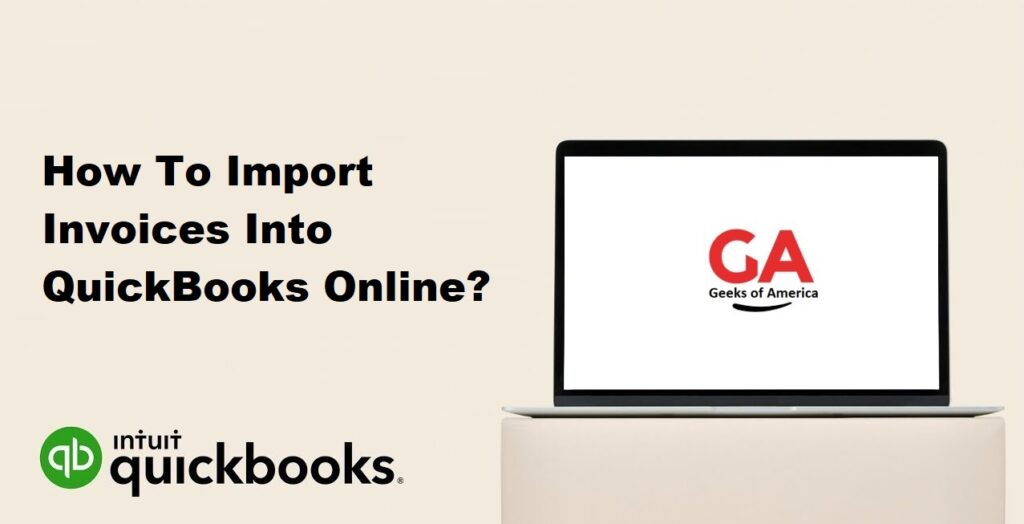Importing invoices into QuickBooks Online can save you time and effort by automating the process of entering data from external sources. This guide provides a step-by-step walkthrough on how to import invoices directly from Excel, spreadsheets, IIF (Intuit Interchange Format), CSV (Comma-Separated Values), and text files into QuickBooks Online.

Section 1: Preparing Your Data for Import
1.1 Data Formatting:
- Ensure your invoice data is organized in a structured manner, with each column representing a specific field such as customer name, invoice number, date, amount, etc.
- Remove any unnecessary formatting, blank rows, or columns that are not relevant to the import process.
1.2 Data Validation:
- Review and validate the data in your file to ensure accuracy and consistency.
- Check for any missing or incorrect information that may cause errors during the import process.
Read Also : How To Remove Customer Credit Balance In QuickBooks Desktop & Online?
Section 2: Importing Invoices into QuickBooks Online
2.1 Accessing QuickBooks Online:
- Log in to your QuickBooks Online account and ensure you have the necessary permissions to import data.
2.2 Navigating to the Import Data Page:
- Click on the “Settings” (gear) icon in the top-right corner of the QuickBooks Online dashboard.
- From the drop-down menu, select “Import Data” or “Tools” and choose the appropriate import option.
2.3 Selecting the Import Type:
- Choose the option that corresponds to the file format you are importing, such as Excel, CSV, IIF, or text files.
2.4 Uploading the File:
- Click on the “Browse” or “Choose File” button to locate and select the file from your computer.
- Follow the on-screen prompts to upload the file.
2.5 Mapping Fields:
- QuickBooks Online will display a preview of the imported data. Map the fields in your file to the corresponding QuickBooks fields (e.g., customer name, invoice date, amount) using the provided options or drag-and-drop functionality.
2.6 Reviewing Import Summary:
- Once the field mapping is complete, review the import summary to ensure accuracy.
- Pay attention to any error or warning messages that may require adjustments or corrections in your data file.
2.7 Importing and Finalizing:
- If the import summary is accurate and error-free, proceed with importing the invoices into QuickBooks Online.
- Follow the on-screen prompts to initiate the import process.
- Once the import is complete, review the imported invoices in QuickBooks Online to verify their accuracy.
Read Also : How To Delete Customer In QuickBooks Desktop & Online?
Section 3: Troubleshooting and Best Practices
3.1 Troubleshooting Errors:
- If you encounter any errors during the import process, carefully review the error messages and make the necessary corrections in your data file.
- Ensure the data format, field mapping, and data content are accurate and aligned with QuickBooks Online requirements.
3.2 Data Backup:
- Before importing invoices, it is advisable to create a backup of your QuickBooks Online data to prevent any loss or unintended changes.
3.3 Data Cleanup:
- Regularly review and clean up your imported data to remove duplicates, reconcile discrepancies, and maintain data integrity.
3.4 Import Templates:
- Utilize QuickBooks Online’s import templates or sample files to ensure proper formatting and field mapping.
- These templates provide guidance on the required data structure and field names.
Read Also : Where Is The Gear Icon In QuickBooks Desktop?
Conclusion:
Importing invoices directly into QuickBooks Online from Excel, spreadsheets, IIF, CSV, or text files can streamline your workflow and reduce manual data entry. By following the step-by-step instructions outlined in this guide and adhering to best practices, you can efficiently import invoices and ensure accurate financial records in QuickBooks Online. Remember to validate your data, review the import summary, and troubleshoot any errors to maintain data integrity throughout the process.
